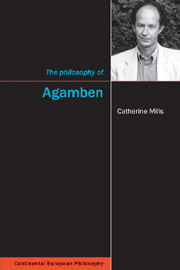Book contents
- Frontmatter
- Contents
- Acknowledgements
- Abbreviations
- Introduction
- 1 Metaphysics: negativity, potentiality and death
- 2 Aesthetics: language, representation and the object
- 3 Politics: biopolitics, sovereignty and nihilism
- 4 Ethics: testimony, responsibility and the witness
- 5 Messianism: time, happiness and completed humanity
- Conclusion
- Notes
- Chronology of major works
- Bibliography
- Index
Conclusion
- Frontmatter
- Contents
- Acknowledgements
- Abbreviations
- Introduction
- 1 Metaphysics: negativity, potentiality and death
- 2 Aesthetics: language, representation and the object
- 3 Politics: biopolitics, sovereignty and nihilism
- 4 Ethics: testimony, responsibility and the witness
- 5 Messianism: time, happiness and completed humanity
- Conclusion
- Notes
- Chronology of major works
- Bibliography
- Index
Summary
Throughout this book, we have seen that Agamben's recent contributions to political and legal theory and to ethics are driven by and based on a complex critique of the metaphysical tendencies within Western thought. For Agamben, much Western philosophy remains tied to ways of thinking about the human that reinstitute and maintain a condition of nihilism by presupposing a non-nature at the heart of human nature. That is, by building an idea of human nature on the conception of having language, where language is founded in negativity, human nature is itself relegated to nihilism. This tendency towards a negative foundation is diagnosed most explicitly in texts such as Language and Death, but also underlies much of Agamben's œuvre. This is apparent in aesthetics, in the metaphysics of will that generates a notion of artistic production as based on the creative will and genius of the artist. In politics, this tendency is manifest in the bio-politics of the exception, wherein human life is caught within the sovereign ban and singularly exposed to death.
Agamben argues that moving beyond nihilism and the Nothing to which human nature is currently relegated requires a deep and radical rethinking of a number of aspects of Western philosophy. This includes the necessity of rethinking time and history on the basis of kairos (rather than chronos), rethinking ethics as ethos without reference to juridical concepts of guilt and dignity, and rethinking community without reference to identity or belonging.
- Type
- Chapter
- Information
- The Philosophy of Agamben , pp. 133 - 138Publisher: Acumen PublishingPrint publication year: 2008



